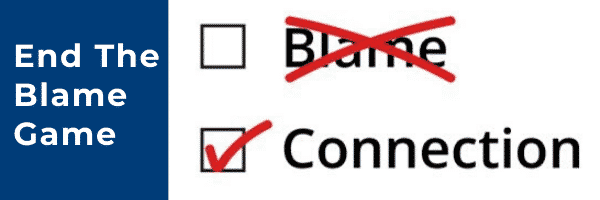During the July 4th weekend, I spoke with an old friend about the state of our country. I moved from feeling frustrated and upset, wanting to blame someone, to sad and fearful because I know when I blame, it only upsets me even more.
Frequently, I feel overwhelmed at the vastness of our problems. I am only one person. How can I possibly make a difference? The answer always comes back – take care of my ‘own backyard’. What can I do to bring peace and understanding to my own backyard?
For me, it starts by making sure that I am not playing the Blame Game. But what does this have to do with hearing loss?
Everything!
You are not a statistic
Hearing loss attacks one in ten Americans, one in six baby boomers and one in three people over the age of 70. It not only affects the person with hearing loss, but it also impacts the entire family or anyone trying to communicate with you. This week, I want to talk to your loved ones, the people living with you OR talking with you by phone. I want to help them understand that you are not to blame.
Communicating with someone who has hearing loss
It’s frustrating when you talk to someone and you have to repeat what you’ve said. Conversation gets interrupted and there’s a breakdown in the spontaneity of communication. Sometimes you decide that what you just said is not worth repeating. You find yourself saying, “Nevermind,” causing your loved one to feel left out. Simple statements and questions begin to substitute the longer, more interesting discussions you once had. This results in a loss of intimacy and a sense of loneliness. Heaven knows, loneliness is reaching its own pandemic levels at this time of the Coronavirus.
The other perspective – when you have a hearing loss
For the hard-of-hearing person, it is exasperating to ask people to repeat what they said, only to have them speak louder and then drop their voice at the end of a sentence. When people speak louder, it sounds like they’re angry or annoyed which chips away at one’s sense of well-being and self-esteem. It’s much easier to accuse people of mumbling. This, in turn, can be frustrating and hurtful to you.
End the Blame Game
What if you took on the attitude that no one is to blame around hearing loss? How might that change your relationships? In the meantime, you can help your loved one by doing the following:
- Do not criticize or condemn your loved one and their hearing problems.
- Walk, and then talk. Whoever starts the conversation needs to walk to the other person, get their attention, and only then, start talking.
- Use your loved one’s name to get their attention. Wait for a second, and then say what you want to say.
- Speak 20% slower instead of louder. Louder doesn’t help nearly as much as slowing down your conversation. Besides, when you slow down, you enunciate your words!
- Use “I” statements rather than “you” statements. The next time you are accused of mumbling, say, “I’m concerned about your hearing. Would you please get your hearing (or hearing aids) checked?” That’s it! Don’t justify your request. Justifying your request sets up the possibility of a power struggle, taking the focus away from the real problem – their hearing and listening challenges.
- Take time to read the linked article on the difference between Hearing and Listening from Seth Horowitz’ fantastic book.
- Be gentle with yourself and your loved one.
Number 7 is worth repeating. Be gentle with yourself and your loved ones…in your own backyard! Practice letting go of the Blame Game because everyone loses at that game.
Did you know you can join them for a hearing consultation to learn more about their hearing? You’ll even get a chance to experience your loved one’s hearing loss. It’s like walking a mile in their ears (or their shoes)!
Back to the person with hearing loss…
Now, would you share this article with your spouse, your son or your daughter, your grandchildren, or a good friend? They’ll be glad you did!


